“Nobody suffered from anything, they were all happy”, former company chief testifies
In today’s testimony at the ECCC, former company chief Chhuy Huy painted a rather positive picture of the work at Trapeang Thma Dam. He continuously stressed that members of his unit helped each other when not able to fulfill the assigned quota. Much of the discussion focused on his lack of memory and inconsistencies between the interview that he gave to the investigative judges six years ago and the testimony given today.
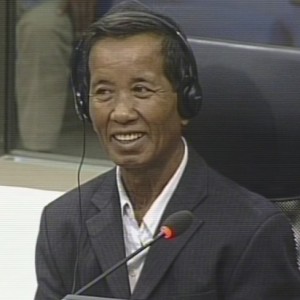
Witness Chhuy Huy
Working Conditions at Trapeang Thma Dam
After the presence of all parties had been confirmed in the morning session, with Nuon Chea participating from the holding cell, the testimony of witness Chhuy Huy started. Mr. Huy, father of six children, was born in 1957 [1] in Thmei village, Nam Tau commune, Phnom Srok district, Banteay Meanchey province. He is currently living in the same village. During the Khmer Rouge regime, this village belonged to Battambang province. Mr. Huy had given one interview to the Co-Investigating Judges before coming to the court today.
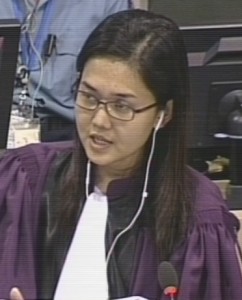
National Deputy Co-Prosecutor Song Chorvoin
National Deputy Co-Prosecutor Song Chorvoin started her line of questioning by asking where the witness lived and what he did before 17th of April 1975. He said he entered monkhood at Nam Tau Pagoda when he was 21 years old, where he stayed for two years before the Khmer Rouge took over power in his area.
Asked about the situation when the Khmer Rouge entered his village, Mr. Huy said that he could not stay at the pagoda anymore and was forced to leave monkhood, because at the time “the Khmer Rouge burned down the village, including the pagoda”. Ms. Chorvoin asked whether she understood him correctly that he had to leave because his pagoda was burned down by the Khmer Rouge, which the witness confirmed. He stated furthermore that he was evacuated to another place. At this point, Mr. Koppe intervened and opposed Ms. Chorvoin’s summary of the witness’s testimony, stating that it was not clear who set the pagoda on fire. Asked more openly by Ms. Chorvoin about who burned the pagoda down. Mr. Huy answered that he did not know.
Working as the Chief of a Company at Trapeang Thma Dam
During the Khmer Rouge regime, Mr. Huy was a sector mobile brigade worker at Trapeang Thma dam worksite. He could not recall the date when he started working there. When working there, he had to carry soil to build the dam. He heard from other workers that the supervisor at the dam site was Ta Val. The witness himself was responsible for a mobile unit when being the chief of a 55-member company in his mobile unit. When Mr. Huy stated that he did not know the number of the company, Ms. Chorvoin referred to his witness statement, where he said that it was Company 1 [2]. Mr. Huy still could not remember. Next, Ms. Chorvoin inquired whether he remembered the names of the battalion chiefs. The witness stated that he could not, since they were in different villages. This prompted Ms. Chorvoin to refer to the same page of his interview, where he stated that “my company was under Chhuong battalion chief. […] And above Chhuong, there was Ta Val, Ta Thang and Ta Pheng. Ta Pheng and Ta Thang were sector mobile unit chiefs and they were the immediate subordinates below Ta Val.” She then inquired whether Chhuong was the chief of a battalion. Mr. Huy confirmed this. Mr. Huy confirmed that he attended meetings chaired by Ta Chhuong or Ta Val, where he was “instructed to work hard in building the dam.” Ms. Chorvoin then asked about the working hours and the type of work at Trapeang Thma Dam. He stated that they worked from 7 am until 11 am and then had a break. He did not shed light on the working hours in the afternoon, but stated that they were required to work at night sometimes. The quota was two cubic meters of soil per worker per day. “The upper echelon set out the work quota for us.” Mr. Huy clarified that he referred to Ta Val with this term. The work quota was imposed during meetings, which “were convened for everyone to attend.” As regards the fulfillment of work quota, Mr. Huy said that “those who were weak” requested help from other people so that they could fulfill the work quota for their unit. Going on, he said that some “were late in their accomplishment. And we agreed to help each other so we could meet the work quota.” The battalion chief Chhuong verified on a daily basis while they were working whether this quota was fulfilled. He came to monitor while they were working. Besides Chhuong, there was no one who verified the work quota. The witness then said that “It was Ta Val who would come to verify the work quota.”
Living Conditions at the Dam
Ms. Chorvoin then turned to the topic of food rations. According to Mr. Huy, there was a shortage of food sometimes. During this time, the food ration of thirty cans of rice per unit per day would be reduced by half. This happened every once in twenty or twenty-five days. When Ms. Chorvoin inquired about the health situation at the dam, Mr. Koppe intervened, stating that the Co-Prosecution should limit the questions to the witness’s unit and not ask questions about the general situation. Ms. Chorvoin then focused her question on Mr. Huy’s unit and other units close by. The witness answered that there were four to five people who were sick within each unit. There was a medic on standby to treat the sick. Ms. Chorvoin further asked to clarify the issue by reciting his interview, where he stated that around twenty out of hundred people were sick.[3] To this, Mr. Huy replied: “I have no idea, because of my memory.” Ms. Chorvoin asked whether it was four to five or rather twenty people falling sick in his unit. Mr. Kong Sam Onn objected to the question, since it was a repetitive question in his view. Ms. Chorvoin pressed on, asking which one of the statements was correct. The witness replied that at a minimum, four to five people would fall sick, and around twenty were the maximum. When someone fell sick, the medicine that was given depended on the medic who prescribed the drug. According to the witness, no one died because of sickness. Ms. Chorvoin then referred back to his statement, where he stated that food rations for sick people was reduced. The sick would be given only porridge. After they recovered, they would receive rice again. Ms. Chorvoin then turned to the issue of hygiene. As for latrines, Mr. Huy stated that they dug a pit where they relieved themselves. Mr. Huy further stated that “as for hygiene, it was very bad. I had my people boil water to drink, but that lasted for only about a month. After that, we stopped doing that.” They took the water from a pond nearby the construction site. To sleep, they built a communal hall and used palm leaves to make a shelter. The communal hall was located a few hundred meters from the construction worksite, where one unit was housed. At this time, the President Nil Nonn adjourned the hearing for a short break.
Temporary removal from his position due to ‘imaginary sickness’
After the break, Ms. Chorvoin took up her line of questioning by returning to the topic of health conditions. She asked about medics at the worksite, quoting his statement where he said that there was blue-coloured medicine,[4] which stands in contrast to his statement that he could not recall whether there was any medicine at all. Mr. Huy confirmed that the information in his interview is correct. However, he “cannot recall the events fully”, because he had sometimes suffered from illness. When he was interviewed by the Co-Investigating Judges, “I could not even get out of my bed.” Pressed on by Ms. Chorvoin, he stated that he did not know which one statement was correct.
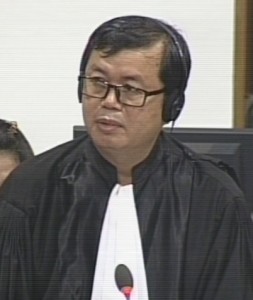
National Khieu Samphan Defense Counsel Kong Sam Onn
Asked about imaginary illness, he said that he had heard of the term. When Ms. Chorvoin asked whether he was ever accused of having imaginary sickness, Mr. Kong Sam Onn objected, since, according to him, the witness had already said that no one was accused of imaginary sickness. Ms. Chorvoin then went on to quote parts of his witness statement, where he said that “They removed me from the company chairman position, because at the time I was a little sick […]. They accused me of having the consciousness illness.” [5] He affirmed now that he was not able to go to work and was accused of having consciousness illness. He was assigned to pick up Rum Peak [6] and to carry ten basket of soil every day until he was able to complete this quota and was sent back to his unit. The name of the battalion chief there was Chhuong. He did not dare to refuse the assignment, because, if anyone did, “he or she was in trouble.” He had to take the medicine with him so that he could take it while working. When Ms. Chorvoin asked whether he voluntarily worked at Trapeang Thma dam, Mr. Huy said that both female and male youths had to go. Asked about biographies, he stated that some biographies were collected by battalion chiefs sometimes. “We all were required to make our biographies.” He did not know why. “It is a doubt for me as well.” As a company chief he was told that biographies had to be collected from everyone. However, someone else collected the biographies of the newcomers. He did not know where the biographies were sent to.
Arrests and Killings
Turning to the topic of arrests and killings at Trapeang Thma, Ms. Chorvoin asked whether these took place in his unit. To this, Mr. Buy stated that one person was arrested. At this point, Mr. Koppe objected to the question, since she had asked about the incident where a person was arrested and killed, while the witness only mentioned that the person was arrested. Ms. Chorvoin said that this might have been caused by an error in translation, since the witness stated earlier that the person was arrested and killed. The president said that the Co-Prosecutor should separate arrest and killings. Ms. Chorvoin proceeded to refer to the incident mentioned in his interview,[7] and asked Mr. Huy to elaborate on the event where members of his unit were arrested and killed. The incident took place at Rumchek at Trapeang Thma. He heard that the person was arrested because “of the biography”. After this biography had been collected, it was clear that the individual had been working in the “civil aviation” and the request was made to the individual to “strip of his clothes” and get away his clothes. Mr. Huy did not know who arrested the person. The individual was arrested at night. Mr. Huy did not witness the arrest, but only overheard about it. “The newcomers” – meaning the people who were evacuated on 17th April 1975 from Phnom Penh – told him that this person was working in the civil aviation before. At the time of the arrest it was not yet resting time and Mr. Huy was still working. He did not know where the person was taken to. When Ms. Chorvoin started reading out an excerpt of the witness’s interview, Mr. Koppe stood up on his foot once more, stating that Ms. Chorvoin should not read out too many details when reading out excerpts. The president observed that the Co-Prosecutor could use a direct quote from Mr. Huy’s written record of interview. Ms. Chorvoin proceeded to ask about a statement given in his interview, asking who shot the person to death and where he was from. Mr. Huy replied that he was a soldier working in the army, attached to Trapeang Thma. Asked whether it was the same person who arrested the man, Mr. Huy stated that he did not know who exactly shot the person. He heard the shot but did not see it. This prompted Ms. Chorvoin to refer to his written record of interview, where he had stated that he saw the arrest. He stated that the version given today is correct: he was at a distance and only heard the gunshot. When Ms. Chorvoin asked whether he saw the person ever again, Mr. Kong Sam Onn made an observation, stating that at another point in the statement he had said that this arrested person made an attempt to flee. The president responded that this was exactly what Ms. Chorvoin wanted to find out. She asked whether the witness ever saw that arrested person again, which he denied.
Forced Marriages
Next, National Civil Party Lead-Co Lawyer Pich Ang took the floor and inquired about forced marriages. The witness replied that “Before we got married, we had to inform the chief of the unit”, and if this person approved, the weddings would proceed. They had to propose it to their superior, and then they would ask the chief of the female unit. One time, there was a marriage of twenty to thirty couples at one time. During the Khmer Rouge regime, he knew of two marriages: once in Trapeang Thma village, and once at the Trapeang Thma Dam Bridge 1. He did not participate in the ceremony. At Trapeang Thma village, there were twenty couples who got married. He saw that each couple at a time “had to commit to the marriage one at a time”. Khieu Samphan Defense Counsel Kong Sam Onn intervened on the basis that both the question and the response were confusing. First, the witness had said that he did not participate in the ceremony, but later stated that he witnessed the ceremony. The president noted that the witness’s state of health was not stable and could not recall all events clearly. He recommended that all parties should pose questions that are easy to understand. When Mr. Ang asked again, the witness said that he only saw the ceremony briefly and walked away.
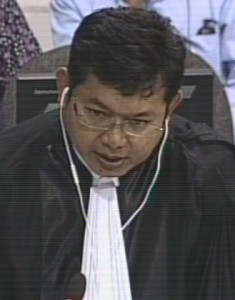
National Civil Party Lead Co-Lawyer Pich Ang
Mr. Ang then inquired about the wedding at Trapeang Thma Bridge 1. The witness could not recall the date. There was an announcement through the loudspeakers about the respective couple, so Mr. Huy briefly went there. In his estimation, there were 13-14 couples. There was a bouquet of flowers in front of the hall, and there were no other people except the couple attending the ceremony. The ceremony was led by the supervisor of the Trapeang Thma construction site. Ta Val was responsible for the Trapeang Thma construction site. The witness, however, was not sure whether Ta Val had presided over the wedding itself. Mr. Huy himself got married in the village at the cooperative. They followed the same proceedings, but in his case, the chief of the village arranged the marriage. There were four couples. This prompted Mr. Ang to refer to his interview, where Mr. Huy had said that there were three couples.[8] After not having received an answer, Mr. Ang moved on. Mr. Ang then asked whether “people who loved each other” decide to marry on their own. Mr. Huy denied this, stating that they had to do this through their respective unit chief. If they chose to live together by themselves without recognition, this was considered “moral offence.” Mr. Ang moved on to his last question, asking what the objective of the marriage was. Mr. Huy said that it was not explained to him, since they only asked individual people to commit to their relationships. Mr. Koppe asked to clarify whether the witness is not feeling well, as said by the president and Mr. Ang, or whether he that was back then. The president said that the witness only recovered from a serious illness shortly before the testimony now. Further, counsels should try to formulate the questions easily. “If we try to use academic verbosity, […] it will be difficult for him to answer.” He then adjourned the hearings.
The mental condition of Mr. Huy
After the morning adjournment, the chamber gave the floor to the defense team for Nuon Chea. Mr. Victor Koppe took the questioning back to the issue of the witness’s sickness, asking what the present condition of the witness was, and what his condition was when he gave his interview to the investigating judges. “Mr. Witness, are you having, as we speak, some form of sickness?” Mr. Huy confirmed this, stating that he sometimes does not feel well, and that he sometimes does not recall things well. He confirmed that this sickness would sometimes affect his memory. Asked whether he had the same condition six years ago when he gave his statement to the investigators, he said that at that time, he might not have remembered everything. Asked by Mr. Koppe whether a doctor told him what caused him to have memory problems, the witness said that he does not understand the question. Mr. Koppe rephrased the question, to which Mr. Huy replied that the doctor did not tell him anything about this. Asked about the specific memory problems that he has, the witness said that he had “a huge disease”. Mr. Koppe inquired further whether the witness had problems remembering events of forty years ago or events that took place recently. The witness replied that he “was not well a few months ago.” Judge Claudia Fenz intervened, stating that they are checking the Witness and Experts Support Unit (WESU) report and that they could come back to the exact medical conditions later once the report is available.
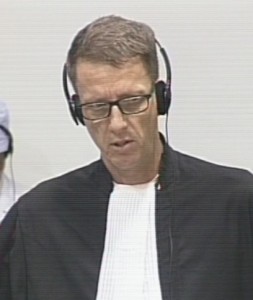
International Nuon Chea Defense Counsel Victor Koppe
Mr. Koppe took Judge Fenz’s advice and moved on to the question of having heard or seen the arrest and killing of a person. Mr. Huy insisted that he only heard the shot and did not see it. The witness confirmed that the statement was read out to him and he approved it with his fingerprints, “but I might not recall everything in it.”
Mr. Koppe asked leave to present the last page of the document to the witness, which contained a drawing and some writing said to be Mr. Huy’s handwriting. The president asked the witness whether he could read and write, which Mr. Huy denied. The president granted Mr. Koppe’s request to show this document to Mr. Huy. Asked whether he recognized this drawing, Mr. Huy stated that he had never seen this before.
Back to Working and Living Conditions
Moving on to another issue, Mr. Koppe inquired which hours the witness was referring to when stating that he also worked at night time. He replied that they worked at night, because there was “a minor plat” that required them to work at night. He then said that the working hours were from 7 pm to 9 pm. Mr. Koppe inquired whether Mr. Huy remembered, as other witnesses did, that this would only occur when the moon gave enough light. The witness confirmed this. Turning to the topic of night blindness, Mr. Koppe asked Mr. Huy what caused people to have this disease. Mr. Huy said that if someone had a night blindness, it depended on the unit chief whether to continue sending them to work. Pressed on the issue of causes, the witness replied that he only heard that people had night blindness. Next, Mr. Koppe read out an excerpt from the witness’s statement: “Each unit was responsible for finding their own meat” and that he therefore assigned members of his unit to fish.[9] Mr. Huy stated that he did not recognize having said this. “You mentioned about an individual named Some Meat, I did not catch it very well.” When Mr. Koppe rephrased his question, he said that some people had to catch fish on a daily basis. Thus, they “could solve the problem of economy.” There were some days, however, that they did not have fish. Sometimes the chief of the construction site would give fish or fish paste. As for vegetables, Mr. Huy stated that on some days, they had vegetables, and others not. He recalled that they ate morning glories that were growing in the open fields. Asked about a connection of eating fish and vegetables on the one hand and night blindness on the other, Mr. Hey stated that he saw some night blinded people who dropped into pits. At this point, Judge Fenz interjected and stated she received information that there was no WESU report on this witness and that Mr. Koppe could therefore continue his questioning about Mr. Huy’s condition. The president informed the Defense Counsel that WESU reported to him that after having recovered from his sickness, Mr. Huy might forget some events. Mr. Koppe requested to receive a copy of the WESU report that the president received. The president instructed Mr. Koppe to continue his line of questioning and informed him that they would send the WESU report. Mr. Koppe then moved on to the health conditions at the dam, asking whether Mr. Huy knew anyone suffering from cholera. Mr. Huy stated that some workers had cholera. Those people who were sick could rest, while the others went to work. Mr. Koppe asked how the witness knew that people suffered from cholera. The witness responded that it depended on the medic to determine whether someone was sick or not. Referring to the witness’s statement, Mr. Koppe asked whether hospital workers were sent to Anlong Sre hospital. Mr. Huy could not remember. Further, Mr. Koppe inquired whether people were sleeping in mosquito nets, which the witness denied. This applied both to his unit as well as to other units. This prompted Mr. Koppe to refer to last week’s testimony, where a witness stated that he was indeed sleeping in a mosquito net and whether Mr. Huy would be able to tell whether this man was an exception. This caused Deputy Co-Prosecutor Song Chorvoin to intervene, asking about the references to this testimony.[10] Mr. Huy then stated that there were one or two members in his unit who brought their mosquito nets from home. He did not know about members in other units. He stated that after one or two year, the upper echelon provided some mosquito nets and clothing. National Counsel for Nuon Chea Liv Sovanna took the floor and started his examination by inquiring about working hours. The witness stated that they started working at 6 am and worked until 11 am. In the afternoon, they resumed at 3 pm until 5 pm. Depending on “the agreement in respective units”, they might have agreed to take breaks when they were tired. When asked whether the people in his unit were allowed to take breaks in between, Mr. Huy answered: “I was very kind to my members. They were all very happy with my leadership at the time. And I never made them work too hard. If they were exhausted, they could take a break.”
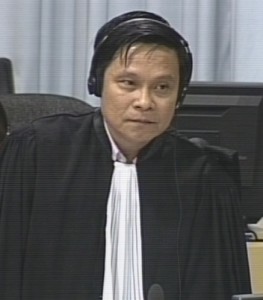
National Nuon Chea Defense Counsel Liv Sovanna
Some people could not finish their quotas on time; if others could finish it ahead of time, they would assist those people. Asked whether he ever imposed punishments if quotas were not fulfilled, Mr. Huy denied this. “Some members were very weak. So we had to help each other”, he said. Mr. Sovanna asked whether there were work accidents or whether people were taken away to be killed. Mr. Huy denied this, stating that “nobody suffered from anything. They were happy.” At this time, Mr. Travis Farr intervened, stating that this question by Mr. Sovanna was a two-part question. Mr. Sovanna replied that this might have been a translation mistake, since he was actually asking whether there were any work accidents that lead to the death of the person. Mr. Huy responded that there were no work accidents leading to death. Turning to the topic of surveillance, Mr. Sovanna asked whether there were any soldiers guarding the workers. Mr. Huy answered affirmed this. However, he did not know what these soldiers intended to do. The soldiers “came to converse with the workers from time to time.” They never “lay any blame on the workers”, however. Mr. Sovanna further asked whether the task allocation was under the sole responsibility and discretion of the respective unit chief and “had nothing to do with the military”. Mr. Huy confirmed this. It was not under the military sphere but under the direct responsibility of the respective unit chief. Asking about economic group, Mr. Sovanna asked whether this group was under the responsibility of the company or of the unit chief. Mr. Huy replied that these economic chiefs were responsible for looking for fish and cooked rice for the entire company. There were four members assigned to look for fish. Four others were assigned to cook rice. Mr. Huy confirmed that this food was prepared for the whole company and not for each single unit separately. At this point, the president handed over the floor to Mr. Arthur Vercken, international Khieu Samphan Defense Counsel. He asked whether it was true that Mr. Huy’s native village was in Phnom Srok district, which the witness confirmed. The distance, according to the witness, between his native village and the dam was around twelve kilometers. Referring to Mr. Huy’s time at Nam Than Pagoda [11], Mr. Vercken inquired about the distance of this pagoda to the Trapeang Thma. Mr. Huy answered that it was around 13 kilometers. The pagoda was around three kilometers away from his home village. Mr. Vercken then mentioned that in Mr. Huy’s interview it was indicated that he spoke Lao and Thai. Mr. Huy denied this. Asked about his specific role at the pagoda and whether he was only learning or also teaching there, Mr. Huy stated that he was an ordinary monk at the pagoda, since he was not educated enough to teach. Turning to the topic of biographies, Mr. Vercken asked what information Mr. Huy indicated in his biography. Mr. Huy answered that he put there that he used to be a monk. Asked whether this had any consequences, Mr. Huy replied that there was “no issue with this at all”.
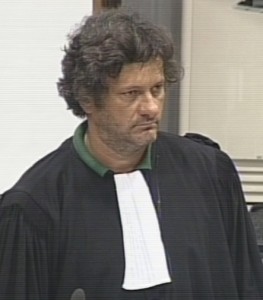
International Khieu Samphan Defense Counsel Arthur Vercken
Mr. Vercken then asked the witness to explain the differences between meetings and assemblies that the witness was referring to in his interview. Mr. Huy stated that they could rest for one or two days when there was an assembly. When asking what the word “assembly” meant, Mr. Huy replied that people would come together and then try to work hard. Mr. Vercken then asked whether this concerned only part of the worksite or the entire worksite. The witness responded that it applied to everyone, and everyone could take rest and came to assemble in one place. Mr. Huy said that it occurred once or twice a year. Mr. Huy stayed at the worksite “until the end” of the regime. He fled alone, while his wife was still working there. Once his wife learned that he went back, his wife also went back home. Pressed on the issue whether this was a flight, Mr. Huy stated that he made a request to work somewhere else, because he was old, which was granted. His wife fled. Asked whether he remembered the date that he started working at the dam site, Mr. Huy stated that he could not recall. It was at the age of 22 or 23.
Before adjourning the hearing for a short break, the president informed Mr. Koppe that there is no medical report on the witness; there is one report by WESU whether the witness was able to testify, which indicated that Mr. Huy might have some issue with his memory after illness.
Back to the Witness’s Health Conditions
After the break, Judge Fenz clarified that the witness has informed a legal officer that he might not remember things well. This information had been provided to the president. There was no separate report on his health. Mr. Vercken then took the floor to ask about the symptoms of Mr. Huy’s sickness. The witness replied that it was nothing noticeable, but that he was generally really tired and sweat a lot. He received an injection. At this point, the president interrupted the questioning and instructed Mr. Vercken to move on. Mr. Vercken insisted on putting questions about this condition. He further inquired whether the witness could remember of only having heard the gunshot and not seen it. Mr. Huy confirmed that he only heard the gunshots. Mr. Vercken then inquired why the witness signed his witness statement in 2011, if this document indicated that he saw this person being shot dead. Mr. Huy did not give an answer to this and only insisted that he did not see it. Mr. Vercken asked at which distance the witness was at the time, to which the witness responded that he was about 50 or 60 meters away. At this point Mr. Farr intervened, stating that it should be clarified whether this question referred to the victim or the shooter. Mr. Vercken clarified this, asking about the distance to the shooter. The witness replied that he was standing 70 meters away from the shooter, but could not see the victim. Turning back, Mr. Vercken again posed the question of why Mr. Huy had signed the witness statement. Asked how often he met the investigator, Mr. Huy said that he met him once for one hour. This prompted Mr. Vercken to point to the Khmer audio recording of the witness’s statement,[12] where the investigator said “in the previous interview […] ”. Vercken asked whether the witness really only met the investigators once. Mr. Huy confirmed this, stressing that he only met the investigator once. Mr. Vercken requested more clarification on the working methods of the investigators, since “this is not the first time this happened.”
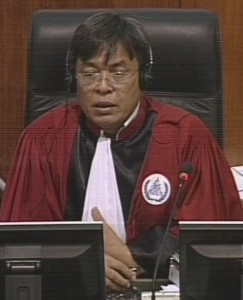
President Nil Nonn
Measuring the Fulfillment of Quotas
Moving on, Mr. Vercken asked about the quota of earth that had to be carried and how Ta Val and Chhuong checked to control the work. Mr. Huy replied that he received the instructions from the upper echelon to monitor that people followed the allocated quota. Then, Mr. Vercken asked how Mr. Huy would measure the fulfillment of the quota. To this, Mr. Huy replied that they had to “make every effort to fulfill the quota.” For those who did not fulfill the quota, he would ask other people to assist. They would measure this with wooden meters. Mr. Vercken insisted on the exact procedure how to measure whether someone had met the quota or not. The witness replied that “as a chief, I monitored the worksite on a daily basis.”
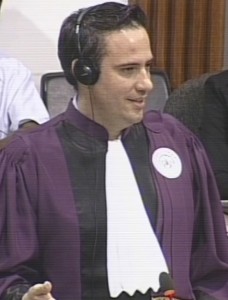
International Senior Assistant Prosecutor Travis Farr
At this point, Mr. Farr intervened, stating that the way of questioning was inappropriate and comments made by Mr. Vercken unnecessary. Mr. Vercken had criticized the witness’s answer without asking a question. To this, the president intervened and observed, directed at Mr. Farr, “you are actually teaching the other party how to frame the questions. Of course, in the course of the proceedings, one party may object against the questions by another party, but here we are not trying to teach the other party how to do it.” Mr. Farr replied that he was objecting to the fact that Mr. Vercken was actually not asking any questions. The president replied that objections can be made, but not if one of the parties tried to teach another party how to question a witness. Mr. Vercken moved on to say that the exact quota seem to have been impossible to be checked and asked whether this was the case. At this point, Civil Party Lead Co-Lawyer Mr. Pich Ang intervened, stating that the witness had answered the question already by stating that they used a wooden meter. Thus, he would object to the question. Mr. Lavergne intervened, stating that there was a wooden measurement and asked whether this was the basis for “inappropriate measurement” as asserted by Mr. Vercken. Mr. Vercken then sought to clarify whether there was only one stick or several ones, and where this stick was located. Mr. Huy replied that they would measure it every day, for example by using their hands or the stick and “we could measure it by that means.” Asking again, Mr. Vercken insisted on the question how many sticks they had for the 150 workers under his order. Mr. Huy could not shed light on this matter. At this time, Mr. Ang objected to the question how Mr. Huy could crosscheck the fulfillment of the quota, stating that every unit chief had to conduct the measurements and not only Mr. Huy. The president instructed Mr. Vercken to move on. Mr. Vercken protested, stating that “it appears that the Civil Parties seem to know what happened very clearly at the time.” Again, the president instructed Mr. Vercken to move on. Mr. Vercken asked again how he knew that everyone had completed the work quota. To this, Mr. Huy replied that he “could not go anywhere before the work quota was completed.” Moving on to his last question, Mr. Vercken asked whether the mother of his six children was the woman he married during the Khmer Rouge regime. Mr. Huy said that it was the one who he married at the dam. Mr. Vercken then gave the floor to his colleague Kong Sam Onn, national Khieu Samphan Defense Counsel. Mr. Kong Sam Onn started his line of questioning by asking about working and living conditions at the dam and whether there were workers sleeping close to Bridge Number 1. Mr. Huy replied that there were no shelters close to the work site “there were only laborers building the work site.” Workers had to focus on the segment they were assigned to work on. Mr. Sam Onn referred to the witness’s statement, where he was asked about Ta Val and had answered that “they stayed near the first bridge.”[13] Asked how many members there were in Ta Val’s group, Mr. Huy replied that he did not know. “He had an unlimited number of subordinates. Vehicles came and went frequently.” Mr. Sam Onn clarified that he asked about close associates of Ta Val that might have stayed close to the dam when he was absent. Mr. Huy replied that those people who were in charge of logistics were staying there on a permanent basis when he was absent. The witness could not recall when the office was built and how often he stayed there. According to the witness, there were vehicles and heavy machinery at the dam. Mr. Sam Onn continue asking whether anyone used Ta Val’s office after he disappeared. The witness replied that he did not work at the site until the completion of the construction. He was working at the rice field for six months and made a request to go back home after this time. This happened almost at the end of the Khmer Rouge regime. Returning to the topic of having been removed from his position, and being assigned to collect Rum Peak and assigned to carry earth after having been removed from his position because of being accused of having had the imaginary sickness. Mr. Sam Onn asked which of the two assignments were under harsher conditions. Mr. Huy replied that when he was accused of having had the imaginary sickness he was reassigned into another work assignment – that is carrying five to six baskets per day. When having been able to complete the work assignment, he was reassigned to his former task. He stated that working conditions were the same. He could not recall how long he worked to collect Rum Peak. It might have been two to three weeks or two months. At the point when the president was on the point of ending the hearing, Mr. Koppe interjected and asked for permission to make submissions regarding the key document hearing that will take place on the 26th, 27th, and 31st of August. Mr. Koppe stated that the Nuon Chea defense team identified thirty documents that were relevant for all three worksites. Of these documents, 22 were relevant for all worksites. He therefore requested to give one full day for the Co-Prosecution and the Civil Party Lead Co-Lawyers for all worksites, then one full day for the defense and lastly a full day for the other parties to react. Mr. Vercken pointed out that this would be the only way to make it feasible for parties to react to the documents, as they would not have time to analyze the documents before. Mr. Farr replied that the Prosecution would be fine with both ways. Civil Party Lead Co-Lawyer Marie Guiraud replied that she did not have any objections to this. The president thanked for the submission. With this, the president concluded the hearing and thanked the witness for his testimony. The hearings will resume on August 25th 2015 at 9 am with the testimony of 2-TCW-269.
[1] The witness also stated that he was born in the year of the dragon, which would correspond to year 1952. [2] E3/5283, at 00295942 (KH) 00321197 (ENG) 00702919 (FR). [3] E3/5283, at 00295946 (KH), 00321201 (ENG), 00702924 (FR) [4] E3/5283, at 00321201 (ENG), 00295947 (KH), 00702924 (FR). [5] E3/5283, at 00295947 (KH ) 00321202 (ENG) 00702924 (FR). [6] Rum Peak (Calamus dioicus) is a specific kind of Rattan-wood (comment by the author). [7] E3/5283, 00295943 (KH), 00321198 (EN) 00702920 (FR). [8] ERN 00295947 (KH) 00321201 (EN) 00702924 (FR) . [9] E3/5283, at 00321201 (ENG ) 00702923 (FR) 00295946 (KH). [10] The relevant document is E3/7802. [11] This might have been an error in translation or spelling, since the witness referred to Nam Thau Pagoda earlier. [12] Khmer audio recording, minute 16; D166/123.1; there was a brief discussion about the Khmer transcript, in which Mr. Vercken clarified that there was an unofficial transcript of the audio recording that he relied on for his argumentation. [13] E3/5283 WRI 00295943 (KH) 00322198 (EN ) 00702920 (FR)
